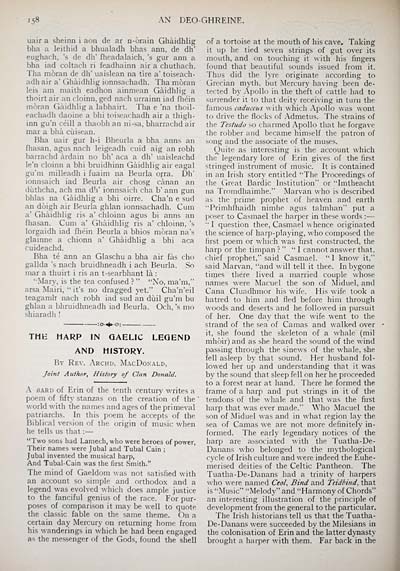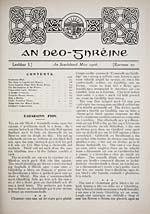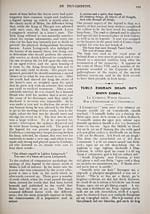Blair Collection > Deo-gréine
(182)
Download files
Complete book:
Individual page:
Thumbnail gallery: Grid view | List view

'58
AN DEO-GHREINE.
uair a sheinn i aon de ar n-òrain Ghàidhlig
bha a leithid a bhualadh bhas ami, de dh'
eughach, 's de dh' fheadalaich, 's gur aim a
bha iad coltach ri feadhainn air a chuthach.
Tha mòran de dh' uaislean na tire a' toiseach-
adh air a' Ghàidhlig ionnsachadh. Tha mòran
leis am maith eadhon ainmean Gàidhlig a
thoirt air an cloinn, ged nach urrainn iad fhèin
mòran Gàidhlig a labhairt. Tha e 'na thoil-
eachadh daoine a bhi toisearhadh air a thigh-
inn gu'n cèill a thaobh an ni-sa, bharrachd air
mar a bhà cùisean.
Bha uair gur h-i Bheurla a bha aims an
fhasan, agus nach leigeadh cuid aig an robh
barrachd àrdain no bh' aca a dh' uaisleachd
le'n cloinn a bhi bruidhinn Gàidhlig air eagal
gu'm milleadh i fuaim na Beurla orra. Dh'
ionnsaich iad Beurla air chosg cànan an
dùthcha, ach ma dh' ionnsaich cha b' ann gun
bhlas na (ìàidhlig a bhi oirre. Cha'n e sud
an dòigh air Beurla ghlan ionnsachadh. Cum
a' Ghàidhlig ris a' chloinn agus bi aims an
fhasan. Cum a' Ghàidhlig ris a' chloinn, 's
lorgaidh iad fhein Beurla a bhios mòran na's
glainne a chionn a' Ghàidhlig a bhi aca
cuideachd.
Bha tè ann an Glaschu a bha air fàs cho
gallda 's nach bruidhneadh i ach Beurla. So
mar a thuirt i ris an t-searbhant là :
".Mary, is the tea confused ? " "No, ma'm,"
arsa Mairi, " it's no dragged yet." Cha'n'eil
teagamh nach robh iad sud an dùil gu'm bu
ghlan a bhruidhneadh iad Beurla. Och, 's mo
shiaradh !
THE HARP IN GAELIC LEGEND
AND HISTORY.
By Rev. Archd. MacDoxald,
Joint Author, History of Clan Donald.
A bard of Erin of the tenth century writes a
poem of fifty stanzas on the creation of the '
world with the names and ages of the primeval
patriarchs. In this poem he accepts of the
Biblical version of the origin of music when
he tells us that : —
"Two sons had Lamech, who were heroes of power,
Their names were Jubal and Tubal Cain ;
Jubal invented the musical harp,
And Tubal-Cain was the first Smith."
The mind of Gaeldom was not satisfied with
an account so simple and orthodox and a
legend was evolved which does ample justice
to the fanciful genius of the race. For pur-
poses of comparison it may be well to quote
the classic fable on the same theme. On a
certain day Mercury on returning home from
his wanderings in which he had been engaged
as the messenger of the Gods, found the shell
of a tortoise at the mouth of his cave. Taking
it up he tied seven strings of gut over its
mouth, and on touching it with his fingers
found that beautiful sounds issued from it.
Thus did the lyre originate according to
Grecian myth, but Mercury having been de-
tected by Apollo in the theft of cattle had to
surrender it to that deity receiving in turn the
famous caduceus with which Apollo was wont
to drive the flocks of Admetus. The strains of
the Tes/udo so charmed Apollo that he forgave
the robber and became himself the patron of
song and the associate of the muses.
Quite as interesting is the account which
the legendary lore of Erin gives of the first
stringed instrument of music. It is contained
in an Irish story entitled "The Proceedings of
the Great Bardic Institution" or "Imtheacht
na Tromdhaimhe." Marvan who is described
as the prime prophet of heaven and earth
"Primhfhaidh nimhe agus talmhan" put a
poser to Casmael the harper in these words : —
" I question thee, Casmael whence originated
the science of harp-playing, who composed the
first poem or which was first constructed, the
harp or the timpan ? " " I cannot answer that,
chief prophet," said Casmael. " 1 know it,"
said Marvan, "and will tell it thee. In bygone
times there lived a married couple whose
names were Macuel the son of Miduel, and
Cana Cluadhmor his wife. His wife took a
hatred to him and fled before him through
woods and deserts and he followed in pursuit
of her. One day that the wife went to the
strand of the sea of Camas and walked over
it, she found the skeleton of a whale (mil
mhòir) and as she heard the sound of the wind
passing through the sinews of the whale, she
fell asleep by that sound. Her husband fol-
lowed her up and understanding that it was
by the sound that sleep fell on her he proceeded
to a forest near at hand. There he formed the
frame of a harp and put strings in it of the
tendons of the whale and that was the first
harp that was ever made." Who Macuel the
son of Miduel was and in what region lay the
sea of Camas we are not more definitely in-
formed. The early legendary notices of the
harp are associated with the Tuatha-De-
Danans who belonged to the mythological
cycle of Irish culture and were indeed the Euhe-
merised deities of the Celtic Pantheon. The
Tuatha-De-Danans had a trinity of harpers
who were named Ceo/, Bind and Teidbind, that
is "Music" "Melody" and "Harmony of Chords"
an interesting illustration of the principle of
development from the general to the particular.
The Irish historians tell us that the Tuatha-
De-Danans were succeeded by the Milesians in
the colonisation of Erin and the latter dynasty
brought a harper with them. Far back in the
AN DEO-GHREINE.
uair a sheinn i aon de ar n-òrain Ghàidhlig
bha a leithid a bhualadh bhas ami, de dh'
eughach, 's de dh' fheadalaich, 's gur aim a
bha iad coltach ri feadhainn air a chuthach.
Tha mòran de dh' uaislean na tire a' toiseach-
adh air a' Ghàidhlig ionnsachadh. Tha mòran
leis am maith eadhon ainmean Gàidhlig a
thoirt air an cloinn, ged nach urrainn iad fhèin
mòran Gàidhlig a labhairt. Tha e 'na thoil-
eachadh daoine a bhi toisearhadh air a thigh-
inn gu'n cèill a thaobh an ni-sa, bharrachd air
mar a bhà cùisean.
Bha uair gur h-i Bheurla a bha aims an
fhasan, agus nach leigeadh cuid aig an robh
barrachd àrdain no bh' aca a dh' uaisleachd
le'n cloinn a bhi bruidhinn Gàidhlig air eagal
gu'm milleadh i fuaim na Beurla orra. Dh'
ionnsaich iad Beurla air chosg cànan an
dùthcha, ach ma dh' ionnsaich cha b' ann gun
bhlas na (ìàidhlig a bhi oirre. Cha'n e sud
an dòigh air Beurla ghlan ionnsachadh. Cum
a' Ghàidhlig ris a' chloinn agus bi aims an
fhasan. Cum a' Ghàidhlig ris a' chloinn, 's
lorgaidh iad fhein Beurla a bhios mòran na's
glainne a chionn a' Ghàidhlig a bhi aca
cuideachd.
Bha tè ann an Glaschu a bha air fàs cho
gallda 's nach bruidhneadh i ach Beurla. So
mar a thuirt i ris an t-searbhant là :
".Mary, is the tea confused ? " "No, ma'm,"
arsa Mairi, " it's no dragged yet." Cha'n'eil
teagamh nach robh iad sud an dùil gu'm bu
ghlan a bhruidhneadh iad Beurla. Och, 's mo
shiaradh !
THE HARP IN GAELIC LEGEND
AND HISTORY.
By Rev. Archd. MacDoxald,
Joint Author, History of Clan Donald.
A bard of Erin of the tenth century writes a
poem of fifty stanzas on the creation of the '
world with the names and ages of the primeval
patriarchs. In this poem he accepts of the
Biblical version of the origin of music when
he tells us that : —
"Two sons had Lamech, who were heroes of power,
Their names were Jubal and Tubal Cain ;
Jubal invented the musical harp,
And Tubal-Cain was the first Smith."
The mind of Gaeldom was not satisfied with
an account so simple and orthodox and a
legend was evolved which does ample justice
to the fanciful genius of the race. For pur-
poses of comparison it may be well to quote
the classic fable on the same theme. On a
certain day Mercury on returning home from
his wanderings in which he had been engaged
as the messenger of the Gods, found the shell
of a tortoise at the mouth of his cave. Taking
it up he tied seven strings of gut over its
mouth, and on touching it with his fingers
found that beautiful sounds issued from it.
Thus did the lyre originate according to
Grecian myth, but Mercury having been de-
tected by Apollo in the theft of cattle had to
surrender it to that deity receiving in turn the
famous caduceus with which Apollo was wont
to drive the flocks of Admetus. The strains of
the Tes/udo so charmed Apollo that he forgave
the robber and became himself the patron of
song and the associate of the muses.
Quite as interesting is the account which
the legendary lore of Erin gives of the first
stringed instrument of music. It is contained
in an Irish story entitled "The Proceedings of
the Great Bardic Institution" or "Imtheacht
na Tromdhaimhe." Marvan who is described
as the prime prophet of heaven and earth
"Primhfhaidh nimhe agus talmhan" put a
poser to Casmael the harper in these words : —
" I question thee, Casmael whence originated
the science of harp-playing, who composed the
first poem or which was first constructed, the
harp or the timpan ? " " I cannot answer that,
chief prophet," said Casmael. " 1 know it,"
said Marvan, "and will tell it thee. In bygone
times there lived a married couple whose
names were Macuel the son of Miduel, and
Cana Cluadhmor his wife. His wife took a
hatred to him and fled before him through
woods and deserts and he followed in pursuit
of her. One day that the wife went to the
strand of the sea of Camas and walked over
it, she found the skeleton of a whale (mil
mhòir) and as she heard the sound of the wind
passing through the sinews of the whale, she
fell asleep by that sound. Her husband fol-
lowed her up and understanding that it was
by the sound that sleep fell on her he proceeded
to a forest near at hand. There he formed the
frame of a harp and put strings in it of the
tendons of the whale and that was the first
harp that was ever made." Who Macuel the
son of Miduel was and in what region lay the
sea of Camas we are not more definitely in-
formed. The early legendary notices of the
harp are associated with the Tuatha-De-
Danans who belonged to the mythological
cycle of Irish culture and were indeed the Euhe-
merised deities of the Celtic Pantheon. The
Tuatha-De-Danans had a trinity of harpers
who were named Ceo/, Bind and Teidbind, that
is "Music" "Melody" and "Harmony of Chords"
an interesting illustration of the principle of
development from the general to the particular.
The Irish historians tell us that the Tuatha-
De-Danans were succeeded by the Milesians in
the colonisation of Erin and the latter dynasty
brought a harper with them. Far back in the
Set display mode to: Large image | Transcription
Images and transcriptions on this page, including medium image downloads, may be used under the Creative Commons Attribution 4.0 International Licence unless otherwise stated. ![]()
| Early Gaelic Book Collections > Blair Collection > Deo-gréine > (182) |
|---|
| Permanent URL | https://digital.nls.uk/76699695 |
|---|
| Description | A selection of books from a collection of more than 500 titles, mostly on religious and literary topics. Also includes some material dealing with other Celtic languages and societies. Collection created towards the end of the 19th century by Lady Evelyn Stewart Murray. |
|---|
| Description | Selected items from five 'Special and Named Printed Collections'. Includes books in Gaelic and other Celtic languages, works about the Gaels, their languages, literature, culture and history. |
|---|

